

See SCS Engineers Waste Management Services
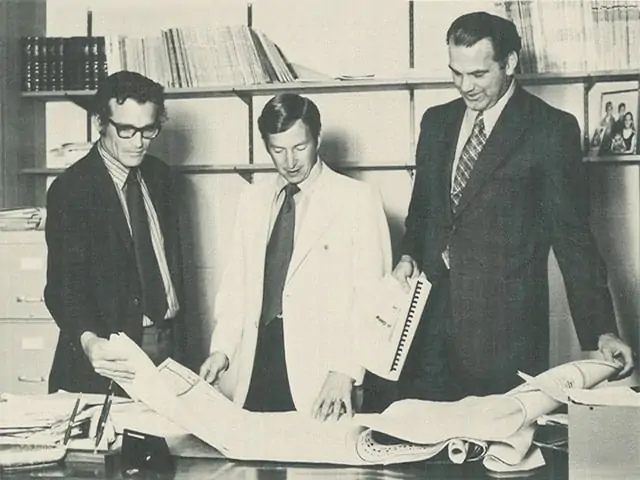
The International Awards Committee and Solid Waste Association of North America (SWANA) Board of Directors unanimously voted to honor Tom Conrad, the “C” in SCS, with the Robert L. Lawrence Distinguished Service Award at WASTECON 2021 in November. The Lawrence award is the highest accolade SWANA bestows on a member of the waste management industry, reserved for those making meaningful and lasting contributions.
“I’m honored and humbled to be selected for the Robert L. Lawrence Award. I thank you and am especially thankful for what SWANA and SCS are today,” stated Tom Conrad.
SWANA recognizes Conrad for over 60 years of significant influence on the waste management and environmental services industry. Conrad, a Founder, Executive Vice President, and Director Emeritus of SCS Engineers, dedicated his career to advancing solid waste management, most notably through the founding of SCS Engineers (Stearns, Conrad, and Schmidt Consulting Engineers) more than 51 years ago.
Tom Conrad worked on a wide range of environmental engineering projects touching almost every aspect of solid waste management throughout his career. As an environmental engineering firm and consultant to the newly created US Environment Protection Agency (EPA), the founders recognized that responsible solid waste management was increasingly important for protecting the environment and the health and safety of the general public.
Leading SCS, he helped the EPA develop the first federal regulations for sanitary landfills, managing and capturing landfill gas, waste sorting protocols, sludge management, and land remediation.
Environmental services, including wastewater management, were always a significant part of SCS services and the waste industry. When new regulatory policies began expanding in the ’80s, SCS’s techniques, technology, and expertise helped a broad range of industries comply with environmental needs and continues today with the firm’s greenhouse gas, landfill technology, renewable energy, remediation, and sustainable materials management programs.
Conrad is also known for hiring and mentoring today’s SCS leaders, many of whom are SWANA leaders, by creating and fostering SCS’s culture encouraging employee participation in industry associations, community, and SCS’s mentorship and leadership programs.
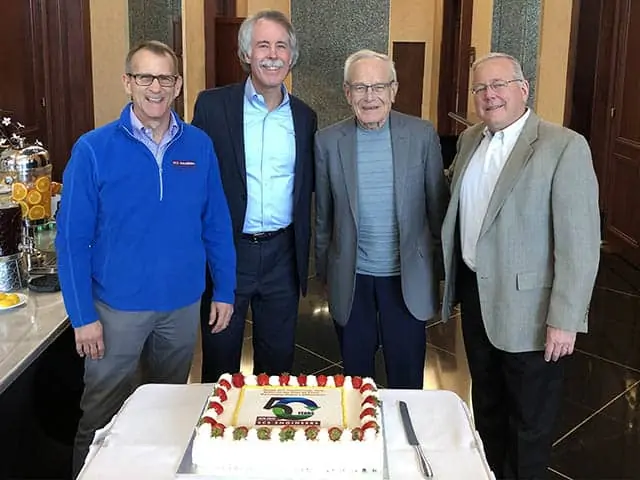
Before his retirement in 2016, Conrad held professional engineering licenses in 24 states. He was a member of SWANA, the American Society of Civil Engineers, the National Waste and Recycling Association, and the Society of American Military Engineers.
He maintains his “work hard – play hard” lifestyle. He is active at SCS, participating in Board of Director meetings and speaking at the Young Professionals Group events and celebrations. While no longer mountain climbing and biking cross-country, he has a vigorous walking, swimming, and biking schedule.
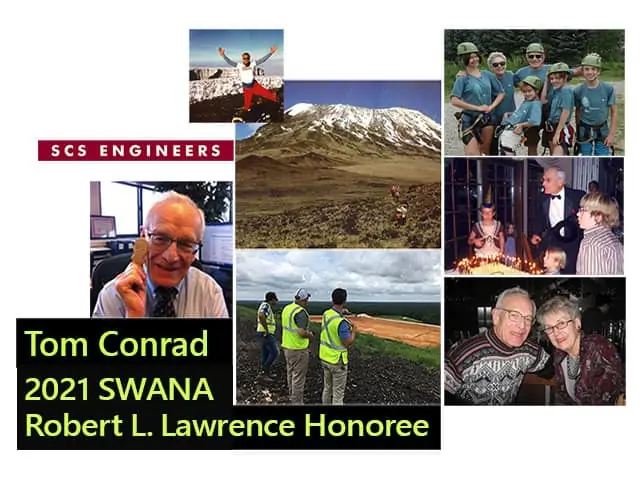
In her first job at SCS Engineers, Joy Stephens worked in a small trailer, consolidating and analyzing data from landfill field techs’ notes, recorded in logbooks they lugged around while navigating the challenging site terrain, then brought to her covered in leachate and mud.
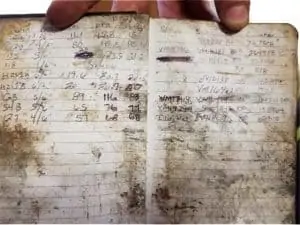
She cross-referenced their detailed, handwritten records with a master list posted on a wall, organized, and methodically examined them. Then she turned them into actionable intel for SCS’s engineers and scientists.
“That was definitely easier said than done. It was a lot of work – a lot of hours to make sure that we were ready for the next day. It struck me that there’s got to be a better way. That we could make collecting and using this valuable information easier for the field staff and OM&M (Operations, Monitoring & Maintenance),” she says.
GIS Supports Wellfield Operations
From that inspiration came a lot of brainstorming, developing, and tweaking what today is a powerful yet user-friendly GIS system that stores and organizes volumes of geographical information in one place and gives users what they need fast to troubleshoot landfill conditions. The customizable application is now used at hundreds of landfills across the country, mainly to support wellfield operations, though it has other landfill system applications.
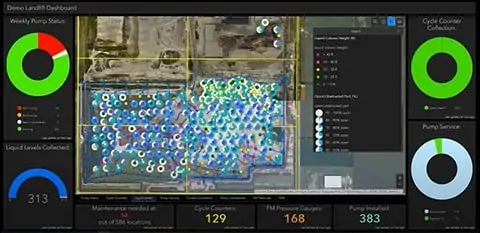
Field techs enter information onto digital forms using a mobile app and submit the data, uploading it to the cloud. OM&M teams have it in a streamlined format in a couple of minutes and can visualize what they are looking for on maps from a dashboard.
The technology that Stephens was an integral player in launching continues to evolve, and there’s a story behind that evolution.
“In the beginning, I reached out to this brilliant young lady, Brooke Aumann, from the Tampa office, who does a lot of GIS work. I had some GIS experience myself, but more landfill knowledge. I picked her brain so we could set up a digital replacement for the logbooks that zeroed in on exactly what the field techs and project managers needed to support our clients,” says Stephens, an environmental scientist.
Together, the two women created experimental web maps to plot and visualize basic information such as the location of each monitoring point, points requiring the collection of liquid levels, and the status of maintenance tasks at each well. Then they developed digital survey forms with more detailed information and connected those forms to the maps; this enabled end-users to overlay even more data for a holistic snapshot of what goes on at wellfields.
“We tried different configurations of web maps and symbology to depict best what we wanted to convey. We talked about what we needed to symbolize and how we needed to symbolize it. And we discussed possibilities for future developments. We knew much more was possible in terms of what we could collect, how all of these data are connected, and how we could exploit the software to better tackle more complex tasks,” Stephens says.
From maps to interfacing data forms to the next level X-ray vision
“Now we’ve gone a step further. We’re doing 3D well visualizations, which give a kind of Superman X-ray vision subsurface. You are literally looking beneath to the well to get good intel,” Stephens says.
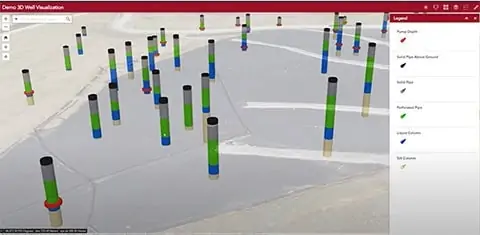
Traversing the World
With undergraduate degrees in Mandarin Chinese and geology and graduate degrees in teaching science and environmental management, Stephens has long loved learning, the environment, and nature.
“When I was young, my parents were missionaries, and I grew up in the most beautiful, pristine, remote areas, like the Solomon Islands and Vanuatu – so unspoiled and lovely.”
It was a sharp contrast to what she would see later when she moved with her young son to China, where she taught math and science. The air quality was poor, and the streets and landscape were inundated with litter.
That experience was the final push that landed the young professional at the foot of a career path she’d considered for some time; environmental sciences. She’d taught it before, but a voice inside her was telling her to pivot and actually start doing the work.
Stephens found her way into a program at a university in Scotland after researching graduate environmental management programs worldwide. At this prestigious learning institution, she first worked with remote sensors and GIS, identifying and addressing “waste crimes,” namely illegal dumping.
Seizing the opportunity to apply her expertise
After graduation, the teacher-turned-scientist took her education and experience back to the United States and SCS Engineers. The company was not foreign to her. By the time she applied, she had made as much a project of vetting employers as she had of scoping out universities. Two draws drew her attention:
“There is the ethos; SCS is genuinely committed to the environment. And the other part that was important to me is SCS is very invested in professional growth and training to foster that growth. I believed that I would have opportunities to move up,” Stephens reflects, recalling when she said yes to the first job working with those logbooks that would be the catalyst to what was to come.
When she came on board, she had to gain practical experience in the solid waste industry and learn the ropes in the field, in addition to her prior experience in renewable energy. In time she had learned her way around landfill gas collection wells, then kept building on that knowledge.
“I asked a ton of questions. Why are we monitoring for this? What constitutes good gas quality? Why is it important to know liquid levels? What is the difference between vacuum and flow? I think asking all these questions, collecting field data myself, and watching what the guys in the field had to do, gave me a good base understanding to help inform how we would capture the right information using GIS. It was a collaborative effort. Brooke worked on many landfill projects and my colleague, Chris Carver, had 16 years of field and project management work. It all came together.”
She later joined the RMC team (Remote Monitoring and Controls), where she received further training in GIS and mastered other skill sets. Today she is a project professional specializing in GIS and drone services.
At home with waste management
The hybrid techie-artist in Stephens comes out when she makes an analogy that tells a little of how her wheels turn.
She grew up playing Legos and now, at almost 40 years old, still builds with them at home with her son.
She approaches the job the same way as when she assembles those sets.
“You know the pieces fit to make something, but it takes creativity to figure out just how to build it and make it as visually pleasing and functional as you can, or to get it to function in different ways. I try to configure and piece together for the best possible design,” she says.
Stephens has married that approach with a desire to be a part of both restoring and protecting the environment. She thinks she’s in the right place to act on that intention.
“I feel like work with waste management and SCS is a way to achieve what I think is so important. We are trying to protect, remediate, and leave conditions better than we found them. That is what being a good steward is all about.”
See Joy Stephens at work in her recent educational presentation for landfill owners and operators. Joy demonstrates technologies to reduce the time to collect, process, and show data.
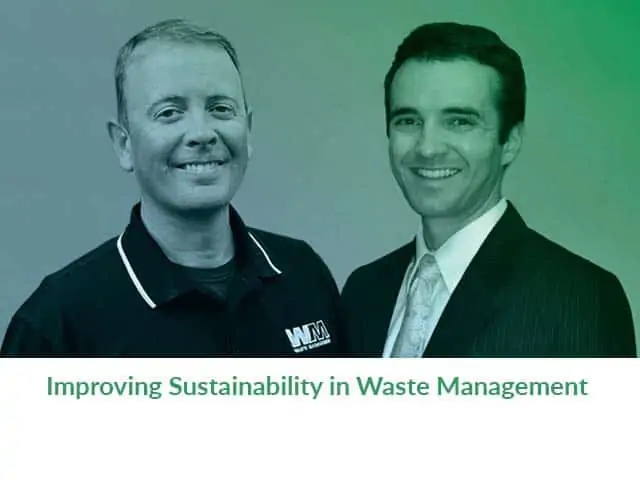
Dave and Dennis discuss how operational improvements are being made in this essential service and its environmental footprint. They dive into the 24/7 maintenance and monitoring of landfills, adjusting to changing conditions in real-time, reducing cost, generating renewable energy, improving the health and safety of operators, and being proactive in a changing world. We also hear about an Ignition-based solution called Connected Landfills that improves connectivity, mobility, and visualization by using data science to facilitate better decisions.
Apple Podcasts | Spotify | Google Play | PodBean | TuneIn
The Virginia Composting Council is the state affiliate of the US Composting Council; its mission is to support the efforts and initiatives of the USCC and bring the practice of composting to more Virginians. The Composting Council is growing because of increased efforts by communities to divert food waste from disposal. Demand is growing with increased awareness of composting’s beneficial uses.
The Virginia Council, led by President Ryan Duckett of SCS Engineers, cites the obvious benefits of less waste going to landfills and lower greenhouse gas emissions in the environment. He also points out the jobs and business development potential and using compost for stormwater management, erosion control, and other green infrastructure as benefits. Expanded programs also offer the opportunity to collect edible foods for non-profits feeding many in need while diverting non-edible organics to composting.
The Council brings together manufacturers, municipal managers, organics collectors, researchers, and other compost allies in the waste industry. The group works to educate state regulators, local officials, and the public about composting’s value in a circular system. Members also help develop positions on regulations and legislation that affect composting and the market.
USCC has 13 state chapters that do local work to advance the composting industry alongside the national advocacy and programs. Without their on-the-ground education, attention to and work in regulations and legislation, and building networks of people in the industry, USCC could not be effective.
Both associations are providing guidance, as many waste management activities must continue. SCS is following association advice, state protocols, and our clients’ recommendations in our own procedures as we continue to perform essential work. We share the SWANA resources and recommendations here and thank them for their dedication. SCS employees should use SCS resources available on the SCS intranet and through our Health & Safety protocol, which reflect the safety precautions advised here.
Reprinted Letter to SWANA Members dated March 23, 2020
As communities and companies throughout the United States and Canada respond to the Coronavirus pandemic, SWANA will continue to provide assistance to its members and the waste industry.
A growing number of states and localities are issuing orders identifying certain industries as “essential” during the pandemic, and these orders typically include the solid waste industry and other categories of employees who may be SWANA members. In those locations, employees and contractors may need to demonstrate proof to law enforcement personnel or others that they work in an essential industry. See this template letter that employers can customize to their needs and provide to employees and contractors. The letter should be on agency/company letterhead and include a contact person and a telephone number to call. The contact person should be familiar with the applicable emergency declarations.
Employees and contractors should carry the customized letter with them at all times, and particularly when they are going to or from work. Several waste industry employees in California in their personal vehicles were stopped on their way to work by law enforcement personnel late last week, but fortunately, their employer had created a letter similar to the attached and the employees were able to show that letter and proceed to their places of employment.
This letter is intended to allow workers to demonstrate that they work in a job category identified as an essential service, including solid waste and recycling operations. It should not be used for any other purpose or by employees that are not actively supporting these operations.
In addition, attached is a notification document for solid waste employers and others to place in their work vehicles to demonstrate they are covered by recent emergency order guidance. It cites the Department of Homeland Security’s Cybersecurity & Infrastructure Security Agency, March 19, 2020 memo that identifies workers engaged in the removal, storage, and disposal of residential and commercial solid waste and hazardous waste as essential infrastructure workers.
Please do not hesitate to contact Jesse Maxwell at or me at if you have any questions about this letter, or need assistance responding to the Coronavirus pandemic. Please stay safe and healthy.
NWRA resources are plentiful and include these:
COVID-19 WORK PRACTICES At this time CDC and OSHA are not issuing waste and recycling specific guidelines for the handling of waste and recycling materials related to COVID 19. If this changes, NWRA will alert its members. Use this industry guidance.
COVID-19 RESOURCES Resources and information provided by agencies and organizations.
Thank you!
This week the solid waste industry is celebrating 25 years of valuable research, inspiration, and support of solid waste professionals provided by the Environmental Research & Education Foundation. On Tuesday, industry leaders met to recognize EREF’s impact on the solid waste industry and acknowledge the role stakeholders play supporting the Foundation and sharing the resulting research.
EREF is a trusted source of data-driven, empirical science for the betterment of solid waste management and policy informing industry, federal and state agencies, academics, and the public. The foundation is also a resource for students and young professionals in the solid waste industry, by providing scholarships, internships, and MSW eTextbook programs. These programs inspire young professionals and ultimately add to EREF’s research and the industry as a whole.
EREF receives funding and participation from companies such as SCS Engineers to continue new research and scholarship programs such as the Robert P. Stearns Master’s Scholarship. The foundation is remarkably successful in producing unbiased reports, which translate ideas and data into action for sustainable waste management practices.
Thank you and congratulations from your colleagues at SCS Engineers for 25 years of scientific research and educational initiatives for the benefit of our industry and the communities we serve.
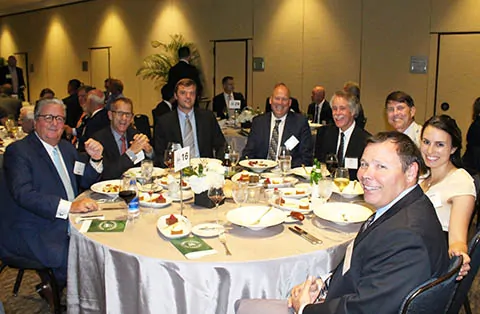
The City of Olathe, Kansas is the fastest growing municipality in the Kansas City metro area, and the Solid Waste Division Manager recognized that increasing population; new, single and multi-family home developments; and growth in commercial establishments would require additional services, resources, and infrastructure to continue the same excellent level of service. The City determined that a long-term, solid waste management plan (Plan) was necessary to address future waste management needs of the City, as well as optimize the performance and efficiency of existing waste management services and facilities.
Olathe’s long-term solid waste plan was a first for the City and resulted in creating tangible pathways to environmental and financial sustainability for the next several decades despite the cost of recycling programs. Customers and elected officials support the City’s approach, surpassing another sometimes-prickly hurdle.
In their recent APWA Reporter article, Karen Luken and Anastasia Welch of SCS Engineers describe how the Olathe Solid Waste Division now has a strategic approach and schedule for adding collection routes, increasing recycling, purchasing equipment, and expanding facilities.
This informative article, Strategic planning for sustainable and stakeholder-supported waste systems is available online at APWA.
Solid Waste Management Planning
Many state and provincial governments have begun promulgating policies and regulations that target the recycling of organics prompting local solid waste agencies to develop advanced municipal curbside collection programs.
A key question for local solid waste agencies to answer is, what types of organic wastes will be targeted for collection and processing? SCS Engineers covers this and other facets to consider as part of your plan, such as:
Read the full article by clicking here.

Not only do these technologies support facilities with their day-to-day operations, they have a positive impact on the market and on safety.
Read and share the article by clicking here.
Waste360 and the Environmental Research & Education Foundation (EREF) plan to deliver a conference program that is more technical, more innovative and more essential to you than ever before. Get ready, look who’s also back!
See the SCS Engineers roundup of presentations at the Global Waste Management Symposium by clicking here.